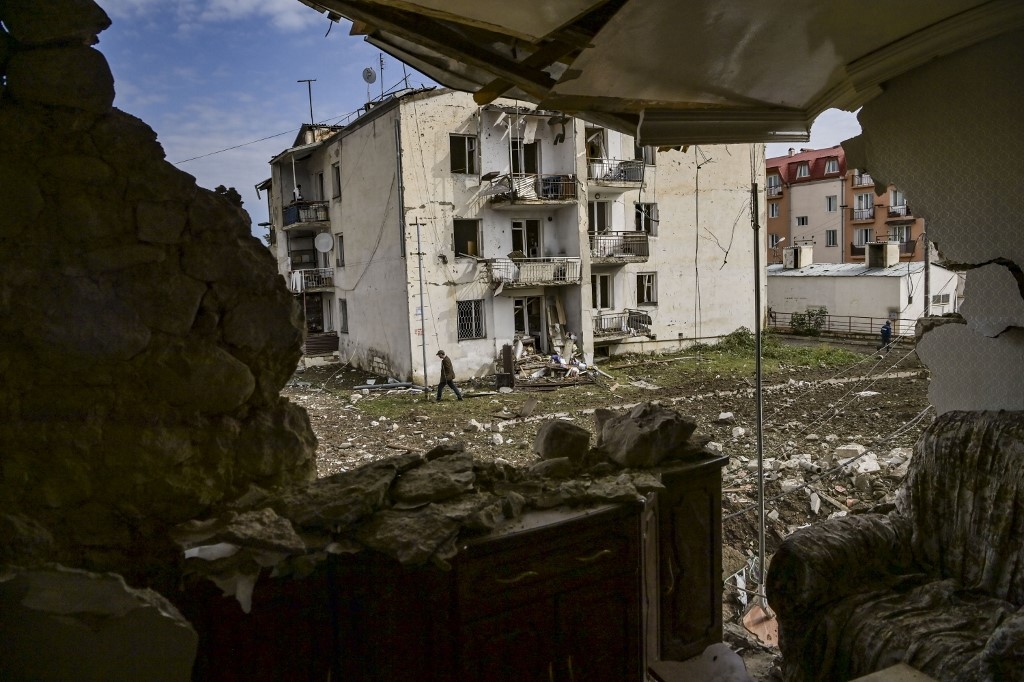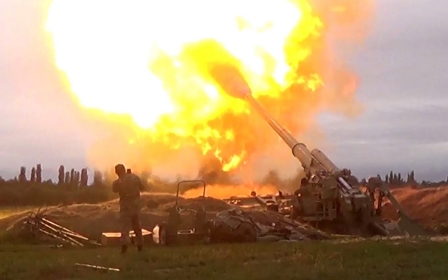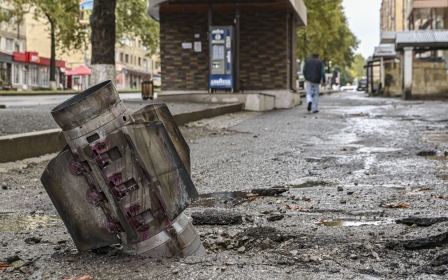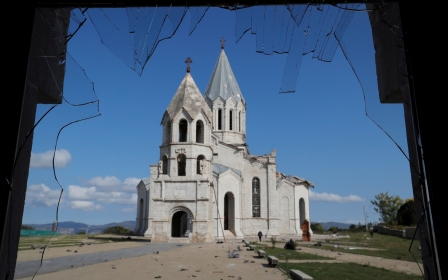Ceasefire shaken as Armenia, Azerbaijan trade accusations of attacks

Armenia and Azerbaijan have accused each other of violating a ceasefire only minutes after it came into effect on Saturday, following weeks of fighting in the disputed Nagorno-Karabakh region.
The Armenian government and ethnic Armenian forces accused Azeri forces of shelling inside Armenia, as well as the Karabakh region, while Azeri forces accused the Armenians of doing the same.
New MEE newsletter: Jerusalem Dispatch
Sign up to get the latest insights and analysis on Israel-Palestine, alongside Turkey Unpacked and other MEE newsletters
Azeri President Ilham Aliyev suggested the ceasefire could still stand, however, in a statement on continuing talks for a political settlement.
The ceasefire was further put into doubt on Saturday evening, when seven explosion rocked Stepanakert, the capital of Nagorno-Karabakh, triggering fresh air raid sirens, an AFP journalist working in the city reported.
Meanwhile, a senior Azerbaijani official told AFP the truce was only meant to be "temporary".
"It's a humanitarian ceasefire to exchange bodies and prisoners. It's not a (proper) ceasefire," the official said, adding that Baku had "no intention to backtrack" on its effort to retake control of Karabakh.
Though clashes in Nagorno-Karabakh are not unusual, the recent flare-up has been particularly intense and involved foreign actors, including Turkey's open backing for Azerbaijan, the presence of Turkey-backed Syrian mercenaries and Israeli weapons allegedly used by both sides. Russia also has a defence pact with Armenia.
Russia negotiated the halt in fighting to enable an exchange of prisoners and the dead but Turkey said more is needed.
"The humanitarian ceasefire is a significant first step but will not stand for a lasting solution," the Turkish foreign ministry said in a statement.
"Turkey emphasised that it will support any solution approved by Azerbaijan. Turkey will continue to stand by Azerbaijan in the field and at the table."
The Azeri and Turkish foreign ministers also spoke by phone on Saturday.
France welcomed the ceasefire, but said it now had to be fully implemented.
"It must now be implemented and strictly observed in order to create the conditions for a permanent cessation of hostilities between the two countries," French foreign ministry spokeswoman Agnes von der Muhll said in a statement.
"Substantial discussions, to which the parties have engaged under the aegis of the co-chairs of the Minsk group, must resume without preconditions." The 13-member Minsk group of countries was established in 1992 to seek a peaceful resolution to the Nagorno-Karabakh conflict.
There are fears over the fighting's potential for causing regional instability. While Russia and Iran support Armenia, Turkey has linguistic and cultural links to Azerbaijan.
Azerbaijan has admitted using Turkish-made drones in the region while Middle East Eye has reported Turkey stationing fighter jets in Azerbaijan.
The clashes have increased concern about the security of pipelines that carry Azeri oil and gas to Europe.
The fighting is the worst since a 1991-94 war that killed about 30,000 people and ended with a ceasefire that has been violated repeatedly.
Nagorno-Karabakh is at the centre of an ethnic and territorial conflict between the two countries that dates back to the early 20th century.
A breakaway Armenian-majority region inside Azerbaijan, Nagorno-Karabakh has around 150,000 inhabitants.
Though it is part of Azerbaijan, Nagorno-Karabakh is run by separatist Armenians supported by the Armenian government. They have sought for decades to split from Azerbaijan and become part of Armenia, though unsuccessfully.
Middle East Eye delivers independent and unrivalled coverage and analysis of the Middle East, North Africa and beyond. To learn more about republishing this content and the associated fees, please fill out this form. More about MEE can be found here.




